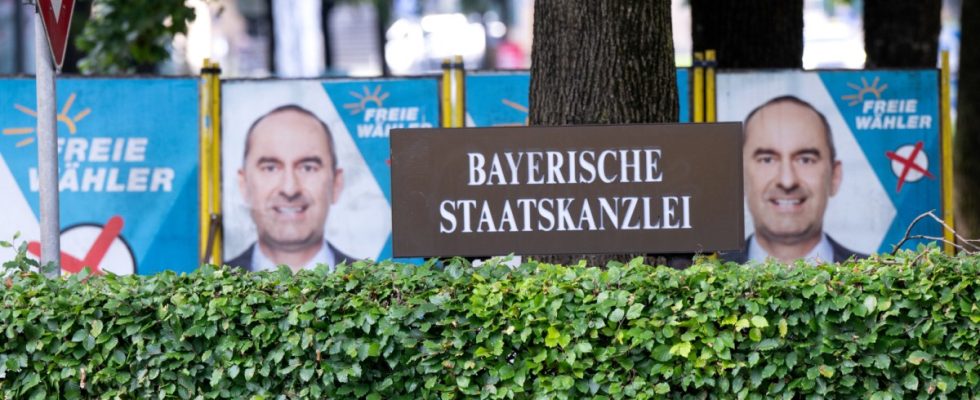The Bavarian opposition is outraged that Prime Minister Markus Söder (CSU) is holding on to Economics Minister Hubert Aiwanger (Free Voters) in the affair surrounding a neo-Nazi leaflet. “Tactics come before attitude at Markus Söder,” said Green Party leader Ludwig Hartmann on Sunday. “He made a bad deal for our beautiful Bayern today.” Because he now continues to tolerate a vice prime minister “whose democratic attitude there are doubts”. SPD chairman Florian von Brunn called Aiwanger “Bavaria’s disgrace”. The fact that the CSU under Markus Söder “accepts an active right-wing populist and formerly a right-wing extremist activist as a deputy in the government is a negative high point in the history of post-war Germany”.
Aiwanger’s answers to Söder’s 25 questions did not convince him, said FDP parliamentary group leader Martin Hagen. Everything the minister says and does in the future will now fall back on the head of government himself. “I’m curious to see how much Hubert Aiwanger will use this free ticket.” For Hagen, the events from Aiwanger’s school days are not decisive, “but how he deals with them today. Instead of sincerity and remorse, we experience gaps in memory and defiant media scolding.” The AfD’s top candidate, Katrin Ebner-Steiner, told BR that the decision was foreseeable. “Without free voters to get the majority, Söder is powerless.”
Skeptical reactions came from the Jewish community. Söder’s decision was “politically acceptable,” wrote the President of the Jewish Community in Munich and Upper Bavaria, Charlotte Knobloch, in a statement. “It remains to be seen to what extent Hubert Aiwanger will be able to use words and deeds to refute the allegations that are still being made. He must restore trust and make it clear that his actions are democratically and legally sound. The doors of the Jewish community were always open to him.” The Süddeutsche Zeitung “You can’t blame her if she brings urgent issues that are brought to her attention to the public,” explained Knobloch. The federal government’s anti-Semitism commissioner, Felix Klein, reprimanded Aiwanger’s handling of the allegations. He suggested that the FW politician not only talk to the Jewish communities, but also visit a memorial site, for example in Dachau.
FW faction leader Florian Streibl, on the other hand, pointed out again that Aiwanger’s brother had identified himself as the author of the pamphlet from his school days. “We are of the opinion that Hubert Aiwanger bears no political responsibility whatsoever for the irresponsible and completely unacceptable actions of a family member more than three decades ago.” Anyone who knows him knows that Hubert Aiwanger “strictly rejects any form of anti-Semitism”. The Bavarian coalition can continue to work stably. Fabian Mehring, the parliamentary managing director of the FW, warned on the “X” platform, formerly Twitter: “Anyone who continues to step on Hubert is strengthening the huge wave of solidarity that has been sloshing through Bavaria for days!”
From the CSU came on Sunday after Söder’s press conference, however, rather restrained reactions. Group leader Thomas Kreuzer called the decision “correct and well-balanced” and dismissing the minister was “not appropriate, even though Aiwanger’s reaction to the incidents and his crisis management were completely unsuccessful.” Kreuzer’s advice is that Aiwanger should now “de-escalate the matter in public discussions and during election campaign appearances.” Bavaria’s anti-Semitism commissioner and former CSU Minister of Education Ludwig Spaenle respected Söder’s “overall assessment”. With his reaction to the allegations, Aiwanger had “been unreasonable for a long time and did not live up to his role model function as Minister of State”. According to Spaenle, he was asked to “counteract the damage he has caused with his actions”.
State President Ilse Aigner (CSU) also criticized Aiwanger’s crisis communication, which “led to this unspeakable stalemate, which has harmed Bavaria as a whole”. The fact that Aiwanger said at a demo in Erding in June that the silent majority must now “take back democracy” was “not exactly helpful for classifying what happened 36 years ago”. CSU General Secretary Martin Huber said that Söder “made it clear in his sovereign statement that we want a stable, middle-class government for Bavaria in the future”. With the addition: “It is particularly important for the prime minister.”
Federal Interior Minister Nancy Faeser (SPD), on the other hand, criticized Söder for acting “out of simple power calculations”, but dealing with anti-Semitism should not be a tactical question. Federal leader of the Greens, Ricarda Lang, announced that Aiwanger “presents himself as a victim and takes no responsibility” – with “bourgeois citizenship and decency” it has nothing to do. Vice-President of the European Parliament Katharina Barley (SPD) commented: “In retrospect, the trumping of German politics will not be associated with the AfD. But with an ignorant, unscrupulous provincial politician and a weak conservative prime minister.”
The Greens, SPD and FDP have requested a special session of the state parliament for Thursday, the interim committee with 51 members. This should also take place according to Söder’s statement. However, like the state government as a whole, Aiwanger is not a regular member there. It is completely open whether he will appear or even allow himself to be questioned. A citation would probably need a majority, including votes from the CSU. Before that, however, the Causa Aiwanger should this Monday the be a topic at the Gillamoos. At the folk festival in Abensberg, Lower Bavaria, there is again the traditional political exchange of blows, with the Bavarian top candidates and national guests such as CDU leader Friedrich Merz. At the FW, Hubert Aiwanger’s speech is the focus.

